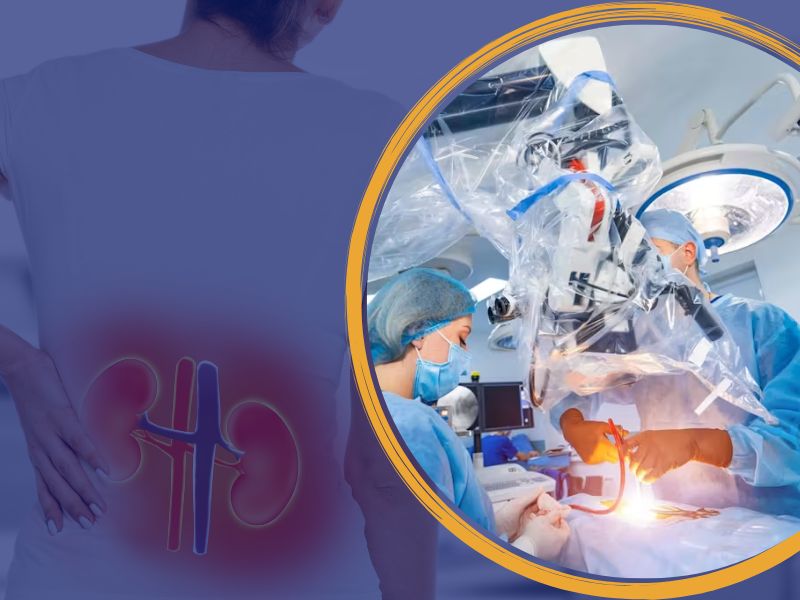Urologic cancers, which include cancers of the urinary tract (kidney, bladder), prostate, and male reproductive organs (testicles and penis), are increasing at an alarming rate in India. The Indian Council of Medical Research (ICMR) reports that urologic cancers have tripled over the past 30 years, highlighting a growing public health concern that demands immediate attention. It is essential to understand the different types of urological cancers, recognize the associated risks, and explore the latest advancements in diagnosis and treatment to ensure early detection and effective management.
Types of Urological Cancers
Urological cancers are classified based on the area of the urinary tract where they develop:
-
Bladder Cancer: In this type, abnormal cell growth is seen in the lining of the bladder.
-
Kidney (Renal) Cancer: A type of cancer that arises in the cells of the kidney. It can occur in both adults and children.
-
Prostate Cancer: A type of cancer that arises in the prostate gland, which is a small gland resembling a walnut located in the male reproductive system.
-
Testicular Cancer: A rarely seen cancer that arises when cancerous cells develop in the testes.
-
Penile Cancer: It is a rare type of cancer that majorly affects men in their 60s.
Symptoms of Urological Cancers
Symptoms vary depending on the type of urological cancer. Common indicators include:
-
Bladder Cancer: Blood in urine, frequent urination, pain while urinating.
-
Kidney Cancer: Blood in urine, persistent lower back pain, unexplained weight loss.
-
Prostate Cancer: Difficulty in urinating, frequent urination, or pain in the pelvic region.
-
Testicular Cancer: Lump in the testicle, pain, or swelling in the testicle.
-
Penile Cancer: Lumps or sores on the penis, changes in skin texture, or discharge.
Treatment Options for Urological Cancer
The management of urological cancers often involves a combination of treatments tailored to the patient’s needs. These may include surgery, radiation therapy, chemotherapy, targeted therapies, and immunotherapy. The goal is to remove cancer, reduce its spread, or manage symptoms while improving quality of life.
Surgery
Surgery remains one of the most effective treatments, particularly for urological cancers. Recent advancements have made surgical procedures safer and less invasive, leading to better outcomes.
-
Transurethral Resection of Bladder Tumor (TURBT): A minimally invasive procedure used to diagnose and treat early-stage bladder cancer. It involves smaller incisions, shorter recovery times, and reduced discomfort.
-
Radical Cystectomy: Performed when the bladder and nearby lymph nodes need to be completely removed.
-
Partial or Radical Nephrectomy: In renal cancer, portions or the entire affected kidney, adrenal gland, and nearby lymph nodes are removed.
-
Prostatectomy: For prostate cancer, minimally invasive or robotic-assisted procedures are commonly used.
Radiation Therapy
Radiation therapy utilizes high-energy rays to destroy cancer cells. It can be delivered in two forms:
-
External Beam Radiation Therapy: Uses external radiation to target cancer cells from outside the body.
-
Internal Beam Radiation Therapy (Brachytherapy): Involves placing radioactive substances directly into or near cancerous tissue. This is particularly effective for prostate and bladder cancers.
Chemotherapy
Chemotherapy uses drugs to kill or slow down the growth of cancer cells. It is typically recommended when cancer has spread beyond its original location. Chemotherapy may be administered orally or intravenously and is often used in conjunction with surgery or radiation to target remaining cancer cells.
Targeted Therapies
Targeted therapies focus on specific molecules or proteins involved in cancer growth, minimizing damage to normal cells. These therapies are often more precise and associated with fewer side effects compared to traditional chemotherapy.
Immunotherapy
Immunotherapy boosts the body’s immune system to fight cancer more effectively. It is commonly used to treat metastatic bladder cancer and advanced renal cell carcinoma, improving long-term outcomes for patients.
The Importance of Awareness and Early Detection
Advances in urological cancer treatment and a better understanding of risk factors have led to improved outcomes. Early detection, coupled with advancements in therapies like radiation, targeted treatment, and immunotherapy, have enhanced the prognosis and quality of life for many patients. Raising awareness about the symptoms, risk factors, and available treatment options empowers individuals to seek timely medical attention, improving their chances of successful management.
By staying informed, recognizing early warning signs, and consulting healthcare professionals, individuals can take proactive steps toward fighting urologic cancers and achieving better health outcomes.
If you are looking for a urology hospital in Bangalore for effective treatment, then look no further than Shree Srinivasa Uro Care, led by Dr. K. S. Shiva Kumar, a renowned Urologist, Uro Oncologist, and kidney specialist.

